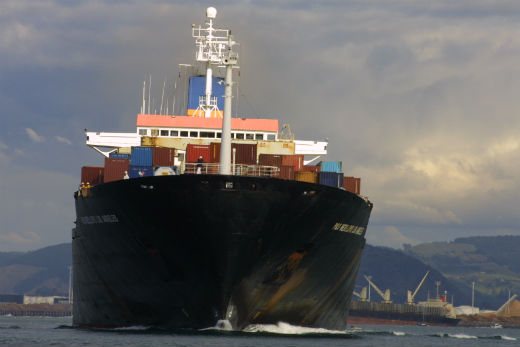Port of Tauranga's earnings for the year are up, boosted by an increase in container traffic, but the net profit is down because of increased depreciation and a drop in log export volumes.
The company's net profit after tax down 2.4 per cent to $77.3 million following increase in depreciation charges and downturn in log volumes, states the port company's annual report released today.
The return to PTL shareholders is 78 cents per share.
Parent EBITDA rises 2.2 per cent to $125.7 million as strong growth in container traffic offsets a decline in log exports.
Container volumes increased 12.1 per cent to just over 950,000 TEUs (20ft equivalent units)
The company is also announcing the first stage of a $140 million capital return to shareholders.
'As signalled at our annual shareholder meeting last year, the board has reviewed our capital structure following completion of a major investment programme and today announced a return of $34 million to shareholders by way of a special fully-imputed dividend of 25 cents per share,” says chairman David Pilkington.
'This is the first tranche of what is targeted to be up to $140 million to be returned to shareholders over the next four years. The final amount returned is dependent on our requirements to fund any potential future growth initiatives.”
The final dividend is 30 cents per share, which lifts total dividends to 53 cents per share - up 1.9 per cent on the previous year.
There is also a special dividend of $34 million, or 25 cents per share, announced as part of the capital restructure targeting to return $140 million to shareholders over the next four years.
The final dividend combined with the special dividend lifts total payments to shareholders for the 2016 financial year to 78 cents per share.
The record date for dividend entitlements is September 23 and the payment date is October 7.
The share price on Thursday morning was $19.75.
The capital restructure will ensure the company has a more efficient balance sheet, remains financially strong and returns excess capital to shareholders in a tax efficient manner, says David.
'A return of the full $140 million to shareholders would still ensure the Company retains a conservatively geared balance sheet and an investment grade credit rating.”
Separately, the Company today announces a share split. Shareholders will receive five ordinary shares for every one ordinary share held at 5 pm on the record date of 17 October 2016.
'The share split, which followed strong enquiry from Port of Tauranga's retail shareholders and share market analysts, is a measure taken to enhance liquidity in the market for shares,” says David.
Parent EBITDA (earnings before interest, taxes, depreciation and amortization) for the year to June 30 rose 2.2 per cent to $125.7 million from $123 million in the previous financial year.
Container traffic rose 12.1 per cent to a record of more than 954,000 TEUs - up from 851,000 TEUs in the 2015/16 year.
The gains are offset by a decline in bulk cargoes reflecting continuing challenges in New Zealand's forestry and agricultural sectors.
Log exports fell more than one million tonnes, with declines also in imported stock feed and fertiliser.
Reported revenues fell to $245.5 million from $268.5 million, due to a $32 million decrease in revenue as a result of having to equity account Tapper Transport as an associate company within the port company's Coda partnership.
Net profit after tax fell 2.4 per cent to $77.3 million as the company's largely completed $350 million five year investment programme resulted in higher depreciation charges, which are up $2.7 million in the current year alone.
'We are very pleased with the progress that has been made against our long term strategy to extend our freight catchment to become the country's leading freight gateway and to prepare to welcome the arrival of the large ships into New Zealand,” says David.
With the five year $350 million investment programme largely complete the port company has the capacity to continue to grow freight volumes for the foreseeable future, and relive constraints now emerging elsewhere in the country's port infrastructure.
'It's clear that port capacity in Auckland is becoming constrained. Thanks to our investment programme, our extensive Tauranga land holdings and our rail-linked MetroPort facility in 'Onehunga, we can significantly expand the volume of imports that can be delivered into Auckland,” says David.
'Such an approach will have the additional benefit of reducing traffic flows in downtown Auckland and negate the need to expand the city's port operations further into the Waitemata Harbour.
'We are willing to engage in a rigorous economic study to examine the optimal port capacity solution for the upper North Island. However, we are optimistic that ultimately, the market will drive any rationalisation required. The arrival of bigger ships – and the efficiencies they can bring – will be a game changer.”
The first of the 9500 TEU, 348m long container ships is due in October. The port company's annual meeting is on October 20.



0 comments
Leave a Comment
You must be logged in to make a comment.